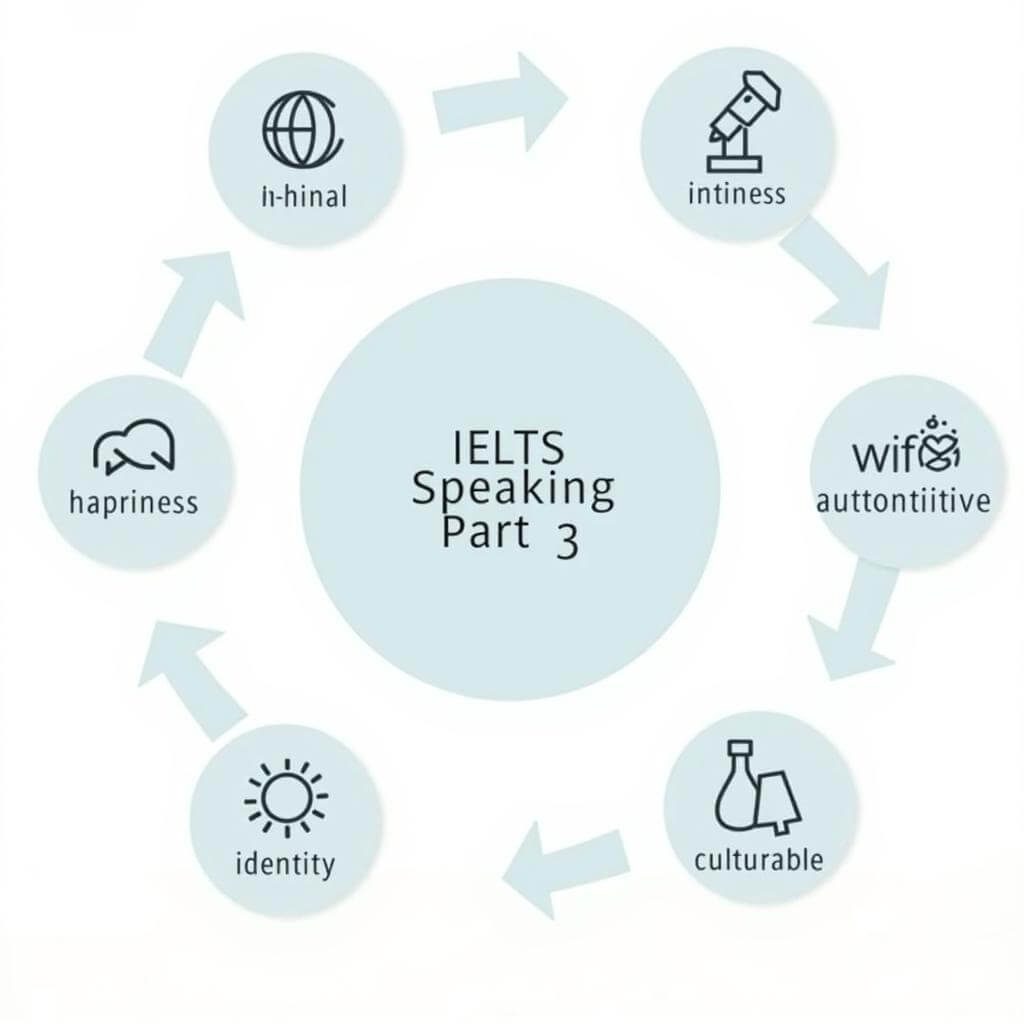IELTS Speaking Part 3 often challenges candidates with abstract ideas, requiring a higher level of critical thinking and language proficiency. This article will explore effective strategies for handling abstract ideas in IELTS Speaking Part 3, helping you boost your confidence and score.
Understanding the Nature of Abstract Ideas in IELTS Speaking Part 3
Abstract ideas in IELTS Speaking Part 3 typically involve concepts that are not concrete or tangible. These can include topics related to society, culture, technology, or human behavior. To excel in this section, it’s crucial to develop a systematic approach to tackle these abstract concepts.
Common Types of Abstract Ideas in IELTS Speaking Part 3
- Social issues (e.g., inequality, globalization)
- Philosophical concepts (e.g., happiness, success)
- Technological impacts (e.g., artificial intelligence, privacy)
- Cultural phenomena (e.g., traditions, identity)
- Environmental concerns (e.g., sustainability, climate change)

Strategies for Handling Abstract Ideas Effectively
1. Develop a Broad Knowledge Base
Expanding your general knowledge is crucial for handling complex opinions with ease. Read widely on various topics, including current affairs, science, and philosophy. This will help you form well-rounded opinions on abstract subjects.
2. Practice Analytical Thinking
Train yourself to think critically about abstract concepts. Ask yourself questions like:
- What are the different perspectives on this issue?
- How does this concept affect society or individuals?
- What are the potential future implications of this idea?
3. Use Real-life Examples and Analogies
Concrete examples can make abstract ideas more relatable and easier to discuss. For instance, when talking about globalization, you might mention how international brands have become common in your local market.
“Incorporating real-life examples not only clarifies your point but also demonstrates your ability to connect abstract concepts with everyday experiences,” says Dr. Sarah Thompson, IELTS Speaking Expert.
4. Employ Appropriate Vocabulary
Enhance your lexical resource by learning vocabulary specific to abstract topics. Use a range of words and phrases to express your ideas clearly and precisely.
5. Structure Your Responses
Organize your thoughts before speaking. A simple structure could be:
- State your main idea
- Provide an explanation or example
- Offer a conclusion or personal opinion
This approach helps in handling difficult questions with ease and keeps your response coherent.
6. Practice Paraphrasing
Develop the skill of rephrasing complex ideas in simpler terms. This is particularly useful when you’re not entirely sure about a concept or when you need to clarify your point.
7. Stay Calm and Confident
Maintain your composure when faced with challenging abstract topics. Remember, the examiner is assessing your language skills, not your expertise on the subject.
Techniques for Elaborating on Abstract Ideas
1. The PEEL Technique
- Point: State your main idea
- Explain: Elaborate on your point
- Example: Provide a relevant example
- Link: Connect back to the main topic
2. The Pros and Cons Approach
When discussing abstract concepts, consider both positive and negative aspects. This demonstrates balanced thinking and provides more content for your response.
3. The Past, Present, and Future Method
Analyze abstract ideas by discussing:
- How the concept has evolved over time
- Its current impact or relevance
- Potential future implications
This approach is particularly effective for handling abstract topics in part 3 confidently.
Common Pitfalls to Avoid
- Overcomplicating your language
- Straying off-topic
- Giving overly brief responses
- Failing to support your ideas with examples
- Speaking too fast or hesitantly
Practical Exercises to Improve Your Skills
- Daily Abstract Topic Discussion: Choose an abstract topic each day and spend 5 minutes speaking about it.
- News Analysis: Read a news article on an abstract issue and summarize it orally in your own words.
- Debate Practice: Engage in friendly debates with peers on abstract topics to practice articulating your thoughts.
“Regular practice with abstract topics significantly improves your ability to handle them confidently in the IELTS Speaking test,” advises Professor Michael Chen, IELTS Preparation Specialist.
Conclusion
Mastering the art of handling abstract ideas in IELTS Speaking Part 3 is a skill that develops with practice and preparation. By expanding your knowledge, honing your analytical skills, and employing effective strategies, you can approach even the most complex topics with confidence. Remember, the key is not just to understand these abstract concepts, but to articulate your thoughts clearly and coherently. With consistent practice and the right approach, you’ll be well-equipped to tackle any abstract idea that comes your way in your IELTS Speaking test.
FAQs
-
How can I prepare for abstract topics in IELTS Speaking Part 3?
- Regularly read on diverse topics, practice discussing abstract ideas, and work on expanding your vocabulary related to complex concepts.
-
What if I don’t understand the abstract topic presented in the test?
- Ask for clarification if needed, and try to relate the topic to something familiar. It’s okay to take a moment to gather your thoughts before responding.
-
How long should my responses be when discussing abstract ideas?
- Aim for responses that are detailed enough to fully express your thoughts, typically 2-3 minutes long, but be prepared to speak for longer if the examiner prompts you.
-
Can I use personal experiences when discussing abstract topics?
- Yes, personal experiences can be excellent ways to illustrate abstract concepts and make your responses more engaging and authentic.
-
How important is it to have a ‘correct’ opinion on abstract topics?
- There’s no ‘correct’ opinion. The examiner is more interested in how you express and support your ideas rather than the specific viewpoint you hold.